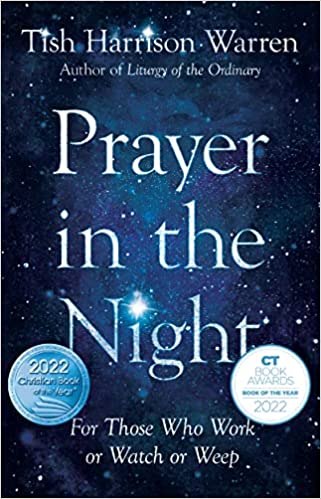This Tuesday, we are discussing Chapter 10 “Soothe the Suffering: Comfort” of the Rev. Tish Harrison Warren’s book Prayer in the Night: For Those Who Work or Watch or Weep. In reading through this chapter, please find a quiet space and a quiet time to allow for self-reflection.
The Prayer:
Keep watch, dear Lord, with those who work, or watch, or
weep this night, and give your angels charge over those who
sleep. Tend the sick, Lord Christ; give rest to the weary, bless
the dying, soothe the suffering, pity the afflicted, shield the
joyous; and all for your love’s sake. Amen.
1979 BCP 134
Suffering:
In writing about these specific words in the Prayer “soothe the suffering,” Rev. Warren points out that the Prayer does not address discrete and separate categories of the human condition. Rather, the categories – the sick, the weary, the dying, the suffering, and the afflicted – often blur together. The Prayer, however, uses this varied terminology to “allow us to pause to honor each kind of human need.” p.124.
She also points out that the way we understand each of these categories also changes based upon where we are in our lives when we pray the Prayer. As she writes: “scripted prayers . . . are not static. As we pray them, we read our own lives back into the words we pray. Our own biographies shape our understanding.” p.125. I have found, that this observation holds true not only for the prayers in our Book of Common Prayer, but within Scripture itself. The words themselves never change, but my understanding of those words and how those words speak to me, do change as I change. As a priest once told me, the words of the BCP are like a precious jewel that refracts the light of Christ differently as we change our perspective.
Rev. Warren, at least at this time in her life, defines “suffering” as an “acute time of pain” p.125. Suffering is a particular event that defines a before and after in our lives. It is that time when things are falling apart but have not yet been rebuilt. For Tuesday, think about how you would define “suffering” when you pray the Prayer.
Meeting God:
The French philosopher Simone Weil (1909-1943) writes that “The extreme greatness of Christianity lies in the fact that it does not seek a supernatural remedy for suffering but a supernatural use for it.” p.126. Suffering does not merely happen to us, but it works within us. What suffering does is strip away our ego-centric self (or our “false self” as Richard Rohr termed it in our prior study). And in the stripping away of the self, we meet God. But just as Christ’s suffering ended in resurrection so to does ours.
Rev. Warren asks us to dive into Martin Luther’s distinction between a “Theology of Glory” and a “Theology of the Cross.” p.128. In a Theology of Glory, suffering is minimized and simply seen as a roadblock to overcome. The Cross (and our suffering) are merely an unpleasant but necessary step on the way to prosperity and personal improvement. On the other hand, a Theology of the Cross says that God’s ultimate involvement in the world is through the Cross, i.e. suffering. It is in suffering where God is found and in suffering where God is working.
The Paraclete:
God, however, does not leave us in our suffering. In his opening discourse in 2 Corinthians, St. Paul uses the words “suffering/affliction/trouble” seven times and the word “comfort” ten times. 2 Cor. 1:3-11. The Greek word for “comfort” is paraklesis which means “a calling to one’s aid, encouragement, and comfort.” Jesus uses this same word in his description of the Holy Spirit. John 14:16. And it is the Holy Spirit (the Comforter, the Paraclete) that will fully teach us all things. John 14:26. As followers of Jesus, the promise is that will not escape suffering, but the promise is also that at the depth of our suffering, God will be there and the Holy Spirit will comfort and guide us.
Questions and Practices:
Rev. Warren’s suggested questions and practices for chapter 10 are:
1. The author discusses how moonflowers grow only at night. Are there particular parts of the spiritual life that “grow only at night”? What have you found growing in your own life during times of struggle or hardship?
2. The author describes the difference between the “theology of glory” and the “theology of the cross.” Are there areas in your life where you have an implicit theology of glory? How about in our culture more generally?
3. In what ways have you known God as a comforter? How is that comfort similar to or different from what you naturally expect or think about comfort?
4. Do you agree that as a culture we rush to get over grief? Do you rush through your own suffering? Where do you see signs of this in your own life or in the surrounding culture?
Dinner is at 6. The menu is tomato soup and grilled cheese. Discussion about 6:45. Compline at 8.
More than that, we rejoice in our sufferings, knowing that suffering produces endurance, and endurance produces character, and character produces hope, and hope does not disappoint us, because God’s love has been poured into our hearts through the Holy Spirit which has been given to us.
Romans 5:3-5

